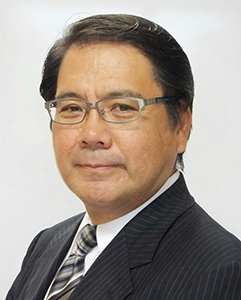

PROF. DR. KAORU TAKARA
Dean
Graduate School of Advanced Integrated Studies (GSAIS) in Human Survivability (Shishu-Kan), Kyoto University
Professor Kaoru Takara has been interested in physically-based stochastic hydrological analysis, using state-space modeling of river basins with advanced technologies such as the Kalman filter, rain radar, satellite remote sensing, geographic information systems (GIS) and computer intensive statistics (CIS). Modeling and forecasting of heavy rainfalls, floods and landslides are key to prevent and reduce disaster risks in river basins. His current interests include: probable maximum precipitation (PMP), probable maximum flood (PMF), frequency analysis of meteorological and hydrological extremes with parametric and non-parametric methods, climate change impacts, downscaling of global climate model (GCM) outputs for applications at basin scale, and disaster risk governance. Prof. Takara published 25 co-authored books, 200+ peer-reviewed papers in academic journals, and 130+ articles in annuals and journals.
He has been contributing to international cooperation research activities through UNESCO International Hydrological Programme (IHP), Asia Pacific Association of hydrology and Water Resources (APHW), International Association of Hydrological Sciences (IAHS), International Water Resources Association (IWRA), International Consortium on Landslides (ICL), ASEAN University Network/Southeast Asia Engineering Education Development Network (AUN/SEED-Net), and Global Alliance of Disaster Research Institutes (GADRI), as well as through a role as an Associate Editor of the International Journal of Flood Risk Management (JFRM).
In the Graduate School of Engineering, Kyoto University, Prof. Takara has produced 48 doctors including international students: Brazil (2), China (5), Croatia (2), India (2), Indonesia (4), Japan (13), R. Korea (3), Lao PDR (1), Malaysia (4), Nepal (4), The Philippines, Taiwan (2), Tanzania, and Vietnam (4).
He is now leading two trans-disciplinary implementation science programs: “Inter-Graduate School Program for Sustainable Development and Survivable Societies” (GSS 2011-2018) in cooperation with nine graduate schools and three research institutes of Kyoto University; and “Japan-ASEAN Science, Technology and Innovation Platform (JASTIP) Disaster Prevention Program (WP4)” implemented by Kyoto University and other Japanese and ASEAN universities (2015-2020).
In April 2018, he has established the UNECO Chair on Water, Energy and Disaster Management for Sustainable Development (WENDI)